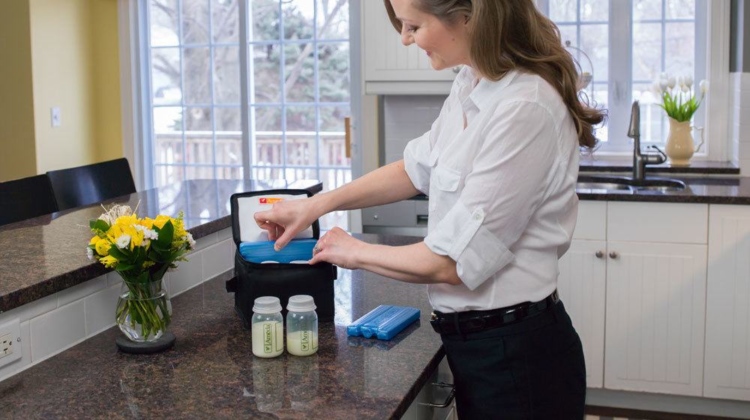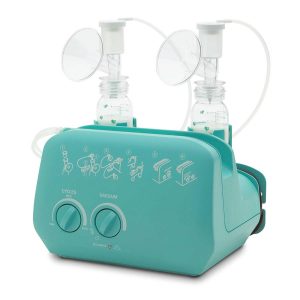
Breastfeeding is considered by many to be the most natural and healthy way for a mother to feed their new-born. Aside from all the health benefits breastfeeding offers, it also plays an important part in deepening the bond between mother and baby.
Boost Your Baby’s Immune System from Day One
The World Health Organisation recommends breastfeeding as the healthiest and most natural way of feeding your baby. The WHO and the HSE also both recommend that mothers breastfeed their babies exclusively for the first six months and continue as they introduce weaning foods.
“Antibodies from mothers are passed on to infants. It is an undeniable, established benefit of breastfeeding. Most vaccines (like MMR) are not required before 6 months because either the baby acquires antibodies through the placenta or breast milk. A recent study also suggested that HIV (enveloped) antibodies transferred to infants fed by HIV-infected mothers protected babies from acquiring HIV” Susan Gentile, Registered Nurse, ChoicePoint
However, breastmilk is still quite misunderstood. Doctors have realised that the composition of breastmilk changes according to babies’ needs, but they do not know how this happens. It has long been known that the first milk produced after birth is packed with colostrum – a nutrient-dense milk packed with antioxidants and antibodies to give baby a base immunity to common ailments that otherwise might cause serious illness. It was thought that after the two to four days of colostrum, breastmilk assumed its ‘usual’ composition, but it has now been discovered that breastmilk changes when baby is ill – sometimes even before mum has realised that there is a problem.
“Breastfeeding has many long-term and short-term benefits for mother and baby. It helps a woman’s uterus contract faster, reduces postpartum bleeding, and can help to lose pregnancy weight more quickly by burning extra calories. Breastfeeding for a longer time reduces the mother’s risk of developing serious diseases, such as breast and ovarian cancer. It is also highly beneficial for the baby. From the materials of mother’s milk, his body cells are grown, energy is obtained, and with it comes protection against infections and many other diseases. Also, most people already know that breastfeeding creates a strong bond between mother and child.” Dr Rosmy Barrios, MD & Medical Advisor, Health Reporter
In addition to this, colostrum also helps to balance a new-born baby’s immune system. This is important because it helps the immune system to recognise viruses and bacteria and respond appropriately. Breast milk contains the proteins lactoferrin and interleukin-6, -8 and -10 which play a big role in regulating the inflammatory response in new-born babies.
Breast Milk Contains Essential Nutrients
While infant formula has come a long way in recent times, breastmilk contains essential nutrients that formula cannot replicate as of yet. One of the most important benefits of breastfeeding is that your baby has access to all the nutrients needed to build a healthy immune system from an early age. Breast milk also helps to establish and promote a healthy gastrointestinal system and can even reduce the tendency to develop food allergies or intolerances later in life.
Breastmilk is considered probiotic and helps to promote the normal functions of the healthy bacteria that reside in the gastrointestinal system. The health benefits of breastfeeding are life-long and can improve the future health and quality of life of your baby. Another one of the benefits of breastfeeding is that it reduces the likelihood of obesity, as breastmilk contains hormones that help babies to regulate their appetite and prevents them from consuming too much milk.

“Breastmilk is obviously hugely important for a baby’s development, providing the ideal amount of energy and nutrients,” notes Jennifer Wilkinson, Neonatal Dietician at Cork University Maternity Hospital. “Perhaps most importantly it’s packed full of essential enzymes, hormones, and antibodies that can fight infections, such as respiratory, UTIs, and gastroenteritis. Breast milk is a dynamic fluid that changes as the baby grows and as its needs change, your breastmilk actually changes too and facilitates these needs. In comparison, formulas don’t contain these critical antibodies and one must remember that powdered infant formula is not a sterile product, it can contain harmful bacteria that may potentially cause serious illness in infants when not prepared correctly.”
How Breastfeeding Benefits You and Your Baby
The benefits of breastfeeding are not limited to the baby, breastfeeding is also great for mums! According to the HSE, breastfeeding mothers’ benefit from a significantly reduced risk of developing breast cancer, ovarian cancer, and even diabetes. The skin-to-skin contact between mother and baby during breastfeeding also strengthens the bond between mother and child and it triggers the release of oxytocin in both the mother and infant. Breastfed babies are less likely to experience upset tummies, which is great for the baby but also makes the parent’s life a lot easier, especially when it comes to dealing with nappies!
“Breast milk is packed with nutrients and antibodies that help boost a baby’s immune system, and it’s easier for a baby to digest than formula. Breastfeeding can also help lower the risk of SIDS, obesity, cancer, and other chronic diseases. For moms, breastfeeding can help reduce the risk of postpartum depression, ovarian cancer, and type 2 diabetes.” Dr Hari Kiran, MD Head, Clinic Spots
Breastfeeding can also be more convenient than bottle feeding since no preparation is required and there is no need to sterilise equipment after use. Some of the other benefits of breastfeeding might only come into play a bit later in life, such as the chance of a higher IQ, but there is no argument that breastfeeding has real and immediate benefits for both mother and child.
How Breastfeeding Benefits the Mother
Aside from the fact that breastfeeding can increase the bond between mother and baby, it also has other important health benefits for mothers too. Research indicates that the benefits of breastfeeding include a quicker and easier recovery after birth. The hormone oxytocin, which is released during breastfeeding, helps the uterus to return to its normal size quicker after birth and can help to alleviate postpartum bleeding. Breastfeeding also burns a lot of calories daily, which goes a long way towards regaining your pre-pregnancy weight quicker.
“Since it will burn up to 500 calories a day to breastfeed, you may end up losing some of that pregnancy weight you gained over the last nine months. This isn’t guaranteed for all women, and it usually begins after the first three months of breastfeeding. Though a benefit, do not restrict your food intake when breastfeeding in order to speed up the process, since you and your baby really do need adequate nutrition at this time” Dr Carrie Lam, MD, Dr Lam Coaching

When breastfeeding, there is no need to lug around a bag filled with bottles and formula which is quite convenient, especially when out and about on a busy day. These are just a few of the health- and practical benefits that can be enjoyed when opting for breastfeeding over using formula.
“For breastfeeding mothers, it can help you lose weight since breastfeeding burns calories, also those mothers who are breastfeeding will see their uterus contract back to near pre-pregnancy levels. When you are pregnant the uterus naturally expands as the baby grows in order to accommodate the child.” Faith Pinah, MD, Unified Pharma
Problems That You Might Face When Breastfeeding
Unfortunately, Ireland has one of the lowest breastfeeding rates in the world, with only two out of three women initiating it before leaving the maternity hospital according to the Irish Maternity Indicator System 2019 national report. Some women can experience problems when breastfeeding, which may discourage them from continuing.
“Some women may have difficulty producing enough milk. This can lead to supply and demand issues and may be a source of depression in some women who do not produce enough milk for their children.” Dr. Boyer, Farr Institute
However, most of these problems can be overcome with proper advice and assistance from a qualified professional such as a midwife. Remember that breastfeeding is a skill that both you and your baby need to learn, while it may seem difficult at first, the benefits of breastfeeding far outweigh the potential problems in most cases.
“I have been fortunate to breastfeed all four of my children over the last 15 years, and am just now weaning my last. I have treasured this special experience with each of them, and while the pros have definitely outweighed the cons for our family, it certainly was not without its challenges.” Alexandra Fung, Co-Founder, Upparent
Can Breastfeeding Hurt?
Some women may experience problems such as sore or cracked nipples in the early days of breastfeeding. However, breastfeeding should not hurt. During the first few days and weeks, it can be uncomfortable when new mums are not experienced in how best to position their breast for comfort and ease of feeding. As a rule of thumb, the more of your breast that is in baby’s mouth, the better. Just having the nipple in baby’s mouth can be incredibly painful, so let them take a good grip on your breast, even if this means they seem to have the entire areola in their mouths – they have no teeth, so can fit a surprising amount of breast in their mouth.
“It hurts like hell in the beginning. You will suffer from sore, cracked nipples if you don’t get them latching correctly.” Aghogho Boccardi, Family & Parenting Expert, Hope Like a Mother
Until your breastmilk comes in fully, feeding can be uncomfortable, but once you have mastered the positioning, it should be completely painless and a beautiful bonding experience with baby.
“The first few weeks of breastfeeding are frequently the most difficult. Some women have problems with their milk supply, which can be excessively high or excessively low. Others suffer from painful or cracked nipples. Mastitis, a potentially fatal breast infection, affects some women. Women who are learning to breastfeed are also adjusting to life with a newborn, which can be difficult due to insufficient sleep and the constant demands of caring for the baby. Many women are also recovering from childbirth. Breastfeeding may be more difficult due to exhaustion and potential difficulties with childbirth recovery.” Bianca Trembley, CEO, The Best Calgary
Other problems can include the overproduction of milk that can lead to sore breasts and, in some cases, blocked milk ducts. In these cases, it might be useful to consider expressing milk frequently by using a breast pump. Expressing milk can alleviate your symptoms but it can also be convenient because it allows your baby to feed even when you aren’t around.

Using a Breast Pump to Express Milk
No matter what the reason for needing to use them, breast pumps offer a simple, painless, and effective way to express your milk. Breast pumps are completely safe to use and do not cause any harm to you or your baby. Many women would prefer to breastfeed their babies but cannot do so due to not being close to their children during every feeding. Breast pumps are the ideal remedy for this because they can be used to express milk for later use and gives a partner or family member the chance to take over.
“Pumping can be a great way for moms to build their supply, maintain supply when away from baby, or work through issues with latching and nursing. For women returning to work, pumping can allow them to continue providing their baby with breastmilk even when they’re not with baby. For moms with premature infants, pumping allows them to build a supply while baby grows and learns to nurse from the breast. It’s also a way for mom to leave baby for a date night, etc. knowing they’ll have milk available even if mom is gone, or for dad to give a bottle overnight!” Aubrey Phelps, MS, RDN, CLC, Matrescence Nutrition
The Pumping Equipment
Old-fashioned breast pumps were hand-operated suction devices that didn’t work very effectively, put a lot of pressure on already tender breasts and generally were seen as objects of torture, rather than the highly useful tools that they should have been. Modern breast pumps are useful tools. Engineers have taken advice from generations of breastfeeding mothers, examined the construction of breasts and the function of the mammary glands, and have built gadgets that work comfortably and efficiently.
Is It Safe to Keep Breastmilk?
Breastmilk is like any other mammal’s milk and will last well if stored properly. It can even be frozen for use later. Obviously, when a baby is to be fed using stored milk, it should be defrosted and then heated to body temperature – much as formula should be. If the milk is used within a day or two, simple refrigeration will be all it needs to keep it fresh, again needing to be warmed before feeding. Breast milk storage bags are available and will keep your breastmilk hygienically storied until the baby needs it.
“Freshly pumped milk can be left at room temperature for about 4 hours. Pumped milk can go into the fridge for 4 days, and the freezer for 3-6 months (3 for a regular freezer, 6 for a deep freezer” Aubrey Phelps, MS, RDN, CLC, Matrescence Nutrition
Suction Breast Pumps
Modern suction breast pumps now use moderate pressure, relying on the shape of the flange – the part of the pump that touches the breast, forming a seal that allows the suction to work – to extract a maximum of milk with a minimum of pressure. They can be operated by hand, with a squeezable valve, or they can simply be put into place and work due to the slight negative pressure difference between the inside of the bottle and the outside, while you get on with watching television, reading a book or scrolling through social media.
Electric Breast Pumps
Electric breast pumps are even more efficient than hand-operated models, with the suction action effectively massaging the breast to encourage your milk production – and you can even find double electric pumps that will draw milk from both breasts simultaneously, saving you time when you are in a hurry to pump milk before rushing off to work or a meeting.
The best breast pump for your needs will depend on your personal preferences: hand pumping is slower, while electric pumps can make you feel a little like a dairy cow – but they are very quick and allow you to save time in your busy day. If you’re looking for a lightweight Portable Breast Pump the Ameda Mya Joy is a fantastic option available for purchase

“Pumps, both manual and electric, work by creating suction. Some also use a bit of vibration. They mimic the sucking pattern of a baby. You start with quick, lower suction sucks at the beginning to trigger a let down (or a release of milk), and then switch to longer pulls with increased suction to help pull the milk out. An electric pump uses a motor and a manual pump would use your hand to create the same effect.” Krystn Parks, IBCLC, Feeding Made Easy
What About Cleaning Your Breast Pump?
Most breast pumps are designed to be easily cleaned, or they are fully contained units that prevent contamination. Read through the hygiene instructions before each use and clean your breast pump according to the manufacturer’s recommendations.
“Hot, soapy water. We always found a little brush, like you might use to clean a bottle or straws, to be helpful to get into the crevices and really get things clean. Some pump parts can go in the dishwasher, which is really helpful! And ideally, pump parts should be sterilized at least once a day. For exclusively pumping moms, having a second set of pump parts can be helpful so they can simply wash everything at home instead of having to do it at work between pumping sessions.” Aubrey Phelps, MS, RDN, CLC, Matrescence Nutrition
Hire not Buy
If you like the idea of using a breast pump for your baby’s feeding needs, but do not want to buy an expensive model, you can hire the breast pump for as long as you are feeding. Some mums breastfeed for up to two years, but babies will enjoy all the benefits of breastfeeding even if you begin to wean them from the breast at six months or so – breast pump rental for this period is sensible, especially if you are not planning on having another child or want to leave a few years between babies. Plus if you want only the best a hospital-grade breast pump is very cost prohibitive. Hiring your breast pump from a medical equipment supply company will ensure that the product you get is hygienic having been through certified decontamination facilities.
Conclusion
Although there are some downsides to breastfeeding, it’s clear to see that the pros outweigh the cons, especially when you consider all the options available to mothers now. If you are struggling to breastfeed, know that you are not alone and that there are supports available, whether it’s getting assistance from a nurse or lactation consultant, or by just easing the burden by pumping regularly – If you want to provide your child with breastmilk, you can.
“We’re delighted to help mothers both new and old throughout their journey. Here at O’Flynn Medical we’ve been supporting mothers in Ireland for over 20 years, offering assistance through our breast pump rental services. If you’re looking for more information on how a breast pump could benefit you, just reach out to us and we’d be more than happy to help” Deirdre O’Flynn, Managing Director, O’Flynn Medical
Contact O’Flynn Medical today to get in touch with an expert who can give you advice on buying or renting a breast pump to give your newborn the best possible start in life.


